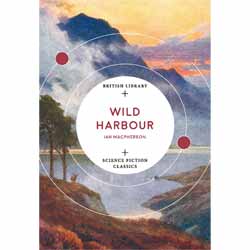|
Click here to return to the main site. Book Review
It is easy to keep to the moral high ground when your belly is full and you have a roof over your head, but what if your circumstances radically change…? Wild Harbour (1936 reprint 2019. 222 pages) is a speculative novel by Ian Macpherson. I have to admit to not knowing this author, but that has been the delight in the British Library Science Fiction Classics series of books, even the short story collections are full of interesting stories from authors who have fallen by the wayside. The book opens in May of 1944. The horrors of the First World War are very much in the minds of the population when it looks like another will breakout, against an unknown country. Terry and Hugh are committed pacifists with no intention of going off to kill strangers. Their morality would rather see them branded as cowards. Living in Scotland, with its often rugged landscape, the pair decide that they will hide out in a cave, live off the land, waiting for the war to end. Their moral principles also allow them to take the high ground, even if they are held accountable after the war has passed. The reality of living off the land soon becomes clear to them. Without the comforts of the twentieth century the two barely survive, much less thrive. Because the two main protagonists are cut off from civilisation, the book does not really reveal who the war was with or its conclusion. The reader is led to believe that regardless of who won, the general devastation was so great that civilisation has effectively ceased to exist. The countryside around their retreat is soon filled with marauding men intent on killing each other for whatever scrap of food or clothing can be obtained. Barely surviving, will Hugh and Terry’s moral stance waver in the face of overwhelming danger? The book is surprisingly well written, although I did find Hugh a little pompous, but then he would be, as he is a product of his time. I’ve already recorded my admiration for the quality of the erudite and interesting introductions which accompany this series. This time you get a five page intro by Timothy C. Baker, Senior Lecturer in Scottish and Contemporary Literature at the University of Aberdeen who places the novel in its context as an important work of Scottish Science Fiction. Given its age, Hugh is presented as a bit of a prig and his attitude towards his wife, while obviously protective, still feels like the sexual hierarchy is firmly in his favour. Social and sexual more change and so we shouldn’t feel so superior to a man who lived ninety years ago. 7 Charles Packer Buy this item online
|
|---|


